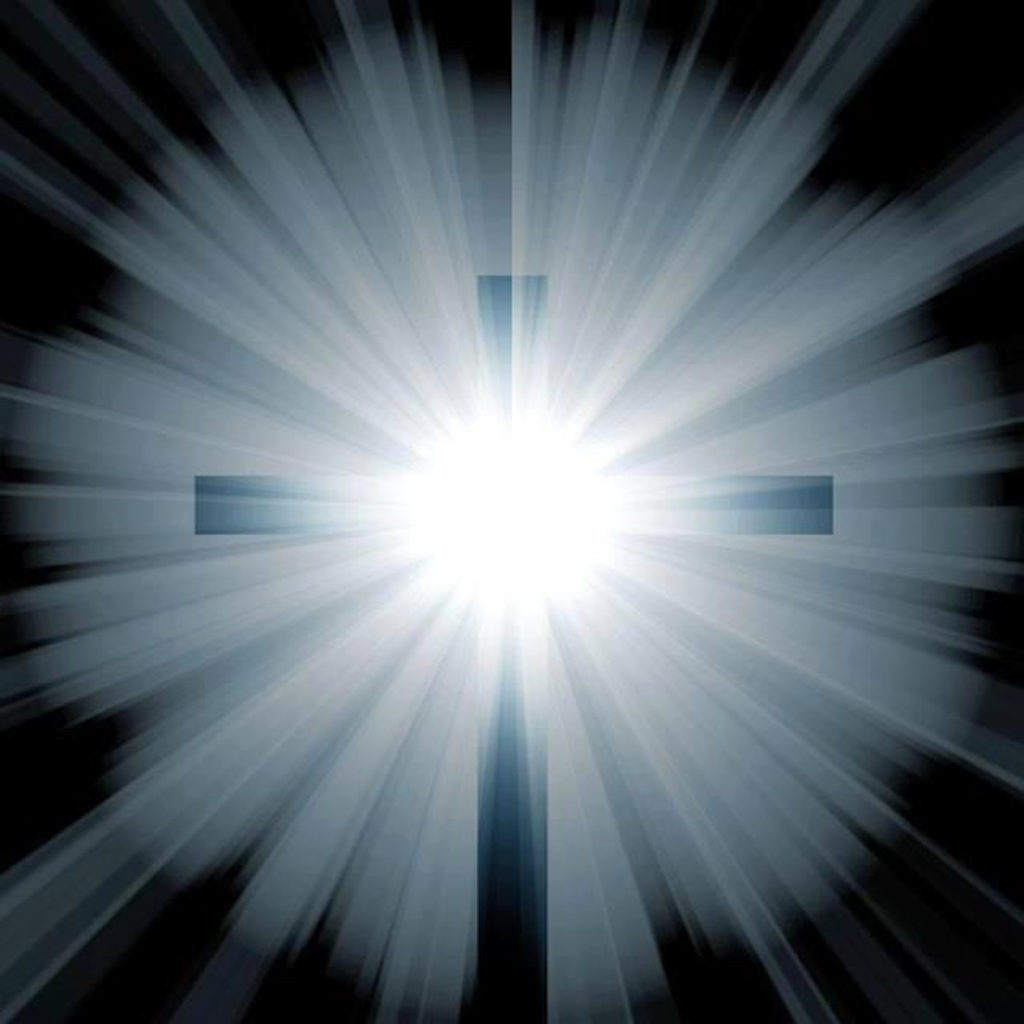
What is a Protestant?
A Protestant is a Christian who looks to the Holy Bible as the sole authority in matters of faith, morals, and doctrine, and rejects the man-made traditions and doctrines of the Roman Catholic Church.
The Roman Catholic Church
The Roman Catholic Church is the remnant of the ancient Roman Empire. But, whereas the ancient empire was ruled by Caesars, the Roman Catholic Church is ruled by priests. It is headquartered at Vatican City, which, at one square mile, is the smallest country in the world. The head of the Roman Catholic Church is a man called the Pope, a title derived from the Latin word papa, which means father. The pope is not only a priest, but also a king, as Vatican City is a recognized city-state. The Roman Catholic Church has its own language, its own currency, and its own army. It also has its own religion, called Roman Catholicism.
Roman Catholicism was founded in 313 A.D. by the Roman Emperor, Constantine The Great. The Romans historically practiced the Mystery Religion of ancient Babylon, and worshipped the Roman pantheon of gods. But Bible-based Christianity, first preached in Rome by the Apostle Paul, was making inroads in the empire, and growing exponentially, despite severe persecution. As Romans were leaving paganism in droves and becoming Christians, Constantine’s power was threatened. So, in order to both placate the pagans, who were his power base, and conciliate the growing Christian population, which was gaining influence, Constantine combined paganism with Christianity and created a new religion under which he would consolidate the empire. To that end, he issued the Edict of Milan, ordering persecutions against the Christians to cease, and making his new religion, which he called Roman Catholicism, the only religion allowed in the empire (catholic means universal). Constantine made himself the head of the new religion, taking the title, Pontifex Maximus; and the Roman Catholic Church was born.
When Constantine moved his headquarters from Rome to Byzantium (modern-day Istanbul, Turkey), the Empire’s capital in the east, the priests of Rome took charge of the temporal affairs of the Western Empire. The head priest became Pontifex Maximus; and, taking the title papa (Pope), Latin for father, declared himself the ultimate authority in both temporal and spiritual affairs. The popes’ authority was at first largely ignored, until the French king Charlemagne took an army to Italy and established the power of the Papacy. Grateful, the Pope crowned Charlemagne the first Holy Roman Emperor in 800 A.D.; and the Roman Empire, a political entity, became the Holy Roman Empire, a theocracy.
The Reformation
With Charlemagne and successive emperors and their armies behind them, the Roman Catholic Church ruled Europe with an iron fist, crushing any opposition to its authority, and severely persecuting anyone, including Roman Catholics, who dared to differ with its practices or challenge its teachings. Then, in 1517, a Roman Catholic monk named Martin Luther published 95 grievances against the doctrines and practices of the Roman Catholic Church and nailed them to the door of the church at Wittenburg, Germany. Luther sought to reform the Catholic Church, which he felt in no way resembled the pure faith of the first century Christian Church. Luther and his followers became known as Reformers, and the movement that resulted from his bold action was called the Reformation.
The Diet of Spires
The term Protestant originated with the Diet of Spires of 1529, which was convened to prevent the progress of the Reformation. (A diet is a general assembly of the estates of the former Holy Roman Empire.) The Diet opened on 15 March, and was attended by Roman Catholic dignitaries and various princes and representatives of imperial cities who were leaning towards Luther’s reforms. The Roman Catholics, particularly given Charles V’s recent successes against the French in Italy, aimed to reverse the policy of religious tolerance adopted by the Diet of Spires of 1526. The meeting was not attended by Charles V, but by his regent, Ferdinand, who condemned the Lutheran princes, denying them the right to choose which religious reforms would take effect in their states, and commanding that all states of the Holy Roman Empire submit to the authority of Rome. On 25 April 1529, the princes lodged a protest against the Diet’s decree, appealing to the Emperor. For this action, they were called Protestants; and the movement begun by Luther was henceforth known as the Protestant Reformation.
The Council of Trent and the Counter-Reformation
In 1545, Pope Paul III convoked the Council of Trent to “define the doctrine of the Church in reply to the heresies of the Protestants, and to bring about a thorough reform of the inner life of Christians [Roman Catholics].” The Council excommunicated (denounced) Luther and the Reformers, placing them under more than one hundred curses; and condemned Protestant doctrine, especially salvation by grace through faith in the shed blood of the Lord Jesus Christ alone. The decrees of the Council of Trent are still in effect today, according to Charles Chiniquy, former Roman Catholic priest and author of Fifty Years in the Church of Rome. All priests, he writes, including the Pope, must affirm the doctrines of Trent.
The Council of Lateran
The Roman Catholic Church calls Protestants (and all who disagree with her) heretics; and, according to the Fourth Council of Lateran of 1215, a heretic deserves to die. Following is that decree:
“We excommunicate and anathematize every heresy that exalts itself against the holy, orthodox and Catholic faith, condemning all heretics, by whatever name they may be known; for though their faces differ, they are tied together by their tails. Such as are condemned are to be delivered over to the existing secular powers, to receive due punishment. If laymen, their goods must be confiscated. If priests, they shall be first degraded from their respective orders, and their property applied to the use of the church in which they have officiated.
“Secular powers of all ranks and degrees are to be warned, induced, and, if necessary, compelled by ecclesiastical censure, to swear that they will exert themselves to the utmost in the defense of the faith, and extirpate [eradicate or destroy] all heretics denounced by the Church who shall be found in their territories. And whenever any person shall assume government, whether it be spiritual or temporal, he shall be bound by this decree.
“If any temporal lord, after being admonished and required by the Church, shall neglect to clear his territory of heretical depravity, the metropolitan and the bishops of the province shall unite in excommunicating him. Should he remain contumacious for a whole year, the fact shall be signified to the Supreme Pontiff (Pope), who will declare his vassals released from the allegiance from that time, and will bestow the territory on Catholics to be occupied by them, on the condition of exterminating the heretics and preserving the said territory in the [Catholic] faith.Catholics who shall assume the cross for the extermination of heretics shall enjoy the same indulgences and be protected by the same privileges as are granted to those who go the help of the Holy Land.
“We decree, further, that all who may have dealings with heretics, and especially such as receive, defend, or encourage them, shall be excommunicated. He shall not be eligible to any public office. He shall not be admitted as a witness. He shall neither have the power to bequeath his property by will, nor to succeed to any inheritance. He shall not bring any actions against any person, but anyone can bring an action against him. Should he be a judge, his decision shall have no force, nor shall any cause be brought before him. Should he be an advocate, he shall not be allowed to plead. Should he be a lawyer, no instruments made by him shall be held valid, but shall be condemned with their author.”
Fifty Years in the Church of Rome, pp. 79,80.
Rome has never repealed the decrees of the Council of Lateran; and, as the Catholic Church claims to be infallible, it never will. All Protestants, therefore, have a price on their head.
Roman Catholicism is Babylonian, not Christian
Many Protestants believe that the Roman Catholic Church is an apostate denomination of the Christian Church, but this is far from the truth. Roman Catholicism was never based on the teachings of Jesus Christ, as revealed in Scripture. Roman Catholic rites such as the Mass, and feasts such as Lent, Easter, and Christmas (Christ Mass) cannot be found in the Holy Bible. That is because Roman Catholic doctrine does not come from the Holy Bible, but from pagan rituals, man-made traditions, papal decrees, and the decrees of ecumenical councils. The Bible calls Roman Catholicism Mystery Babylon, the pagan worship of Cush, Nimrod, and Semiramis–history’s first deified mortals and the original satanic trinity.
Cush
According to the Bible, Cush was the grandson of the patriarch Noah, one of eight people to survive the Great Flood. Known as Al Khem “The Burnt One” and Ethiops “The Black One,” Cush is the father of the dark-skinned races. It is from the name Al Khem that we get the occult term alchemical. This is important, as alchemy is merely another name for the Mystery Religon, which Cush founded.
Nimrod
Cush’s son Nimrod was the first king of Babylon, the first kingdom mentioned in the Bible. He was also the first deified mortal in history. The Bible says this about Nimrod:
“And Cush begat Nimrod: He began to be a mighty one in the earth.”
Genesis 10:8
This is proof that Nimrod was worhsipped, as the word translated “mighty one” is the Hebrew word el, which means a god.
Semiramis
Nimrod’s wife Semiramis was Babylon’s first queen. She was formerly the wife of Nimrod’s father Cush; and, like Nimrod, she was also deified. Historian Alexander Hislop writes in The Two Babylons that Semiramis was known in the old world as Myrianimus, “The Goddess of Ten Thousand Names.”
Evidence that the Roman Catholic Church is Mystery Babylon can be found on the coat of arms of Pope Emeritus Benedict XVI.
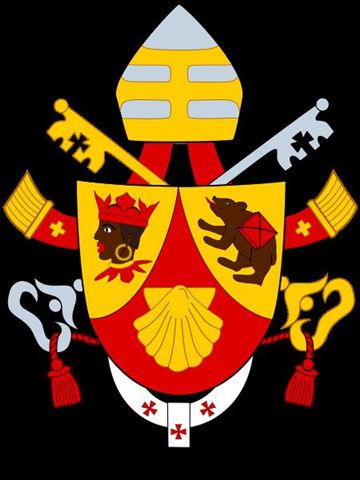
The coat of arms features a black king, a bear with its tongue sticking out, and a seashell. None of these symbols are used in the Bible as symbols for the Lord Jesus Christ, but they do have great significance in the Mystery Religion. The black king may be Cush, and the bear, Nimrod. Nimrod was also known as Tammuz (he who purifies by fire), which would account for the “T” on the bear’s side. On the other hand, both the king and the bear could be Nimrod; as two occult symbols are often presented together to associate the one with the other. Nothing is coincidental or arbitrary in the world of the occult, so the fact that both the king and the bear are black is significant.
The seashell is at the center, signifying that it is more important than the other two symbols. The Bible does not use the seashell as a symbol for Jesus Christ, so it must represent something or someone else. The seashell is in fact a symbol for Semiramis, who, in Rome, was worshipped as Venus and Diana. According to Roman mythology, Venus was born of the sea, and emerged fully grown from a seashell.
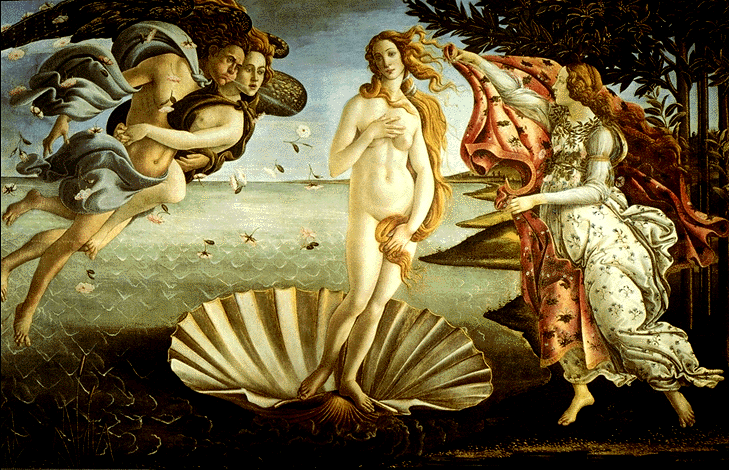
The Roman Catholic Church worships Venus as the Virgin Mary, and uses the seashell as one of her symbols. The title Mary comes from the Latin word mari, which means sea. This is the origin of the Virgin Mary’s title “Star of the Sea.” The seashell is a prominent symbol in the Roman Catholic Church.
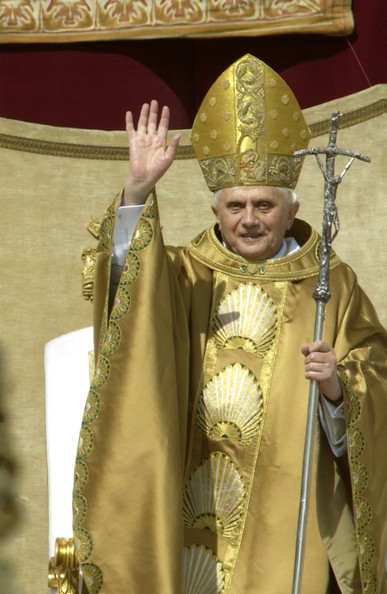
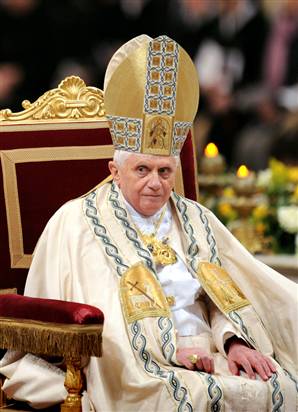
Roman Catholicism places its traditions above the Bible
The romish church claims that its traditions are as authoritative as the Bible; and the Council of Trent, considered the most important of all Roman Catholic Church councils, decreed that Roman Catholic tradition is as divinely inspired as the Bible:
“Following, then, the examples of the orthodox fathers, [the Council of Trent] receives and venerates with a feeling of piety and reverence all the books of the Old and New Testaments, since one God is author of both; also the traditions, whether they relate to faith or to morals, as having been dictated either orally by Christ or by the Holy Ghost, and preserved in the Catholic Church in unbroken succession.”
Council of Trent, Fourth Session, April 1546.
Because the words of God’s creation can never compare to the Word of the Creator, to put tradition on par with the Bible is to actually puts those traditions above the Bible, making the Word of God “of none effect.”
The Pope vs. Jesus Christ
The Pope holds the title Vicar (substitute) of Christ. He claims to be the representative of the Lord Jesus Christ on earth; and, as such, to be the ultimate spiritual and temporal authority on earth. As the Lord Jesus Christ is God Almighty, then the Pope actually claims to be God. And not only do Pope Francis and Pope Benedict XVI believe this, but so have all the popes before them:
“We declare, assert, define, and pronounce: to be subject to the Roman Pontiff is to every human creature altogether necessary for salvation…”
Pope Boniface VIII, “Unum Sanctum.”
“We hold upon this earth the place of God Almighty…”
Pope Leo XIII, “The Great Encyclical Letters of Leo XIII,” 1908.
“I am in all and above all, so that God, Himself and I, the Vicar of God, have but one consistory, and I am able to do almost all that God can do…What therefore, can you make of me but God?”
Pope Nicholas. From “Antichrist” by Ian Paisley. See Decretales Comini Gregorii Papae LX (Decretals of The Lord Pope Gregory LX).
This is a literal fulfillment of biblical prophecy.
“Let no man deceive you by any means: for that day shall not come except there come a falling away first, and that man of sin be revealed, the son of perdition: Who opposeth and exalteth himself above all that is called God, or that is worshipped; so that he as God sitteth in the temple of God, showing himself that he is God.”
2 Thessalonians 2:4
The Protestant’s Responsibility
Stick to the Bible
If your spiritual beliefs and practices are not Bible-based, then there is no difference between you and a Roman Catholic. It was the fact that virtually everything Roman Catholicism taught and practiced was contrary to Scripture that led Martin Luther to write his 95 theses. Without the Bible, there would have been no Reformation. Make the Bible the foundation of your faith, and don’t believe or do anything spiritually that is not based on the Bible.
Reject Roman Catholicism
The Apostle Jude wrote:
“Beloved, when I gave all diligence to write unto you, it was needful for me to write unto you, and exhort you that ye should contend earnestly for the faith that was once delivered unto the saints. For there are certain men crept in unawares, who were before of old ordained to this condemnation, ungodly men, turning the grace of our God into lasciviousness, and denying the only Lord God, and our Lord Jesus Christ.”
Jude 3
The Roman Catholic Church are the ungodly men who have crept in unawares. In his sermon, “From Rome To Christ,” former Jesuit priest Alberto Rivera said that in order to sanctify ourselves, we must eliminate Roman Catholicism from all phases of our lives. This we do by rejecting it. We must reject the idea that Roman Catholics are Christians who merely have a different worship tradition. Roman Catholicism is idolatry, and idolatry is not Christian.
We must reject the claim that the Pope of Rome is the Vicar of Christ, as there is no substitute for the Lord Jesus. The Lord Jesus said that a man cannot have two masters, for he would love one, and hate the other. One cannot follow the Lord and also follow men. To accept the Pope as Christ’s vicar is to deny the Lord Jesus who bought us with His own blood. We don’t want to do that.
We must not fellowship with Roman Catholics in a religious context. That means that we must not go to church with them, we must not worship with them, and we must not pray with them. We must also not participate in the National Day of Prayer (a Roman Catholic-led event), or any state or local prayer events (like the Missouri PrayerFest). The goal of these events is ecumenism: to unite Roman Catholics with Protestants and other religions under the guise of praying for our nation and communities. This is part of the one-world agenda to unite all religions under the banner of Roman Catholicism. We also must not observe pagan Roman Catholic holidays like Lent, Easter, and Christmas.
Protest
To protest not only means “to object to,” but also “to proclaim or make known.” We must, therefore, not only object to the unbiblical claims of the Roman Catholic Church, but also contend for the faith by proclaiming the Gospel of Jesus Christ to the world.
Pray for Roman Catholics
Sincere Roman Catholics are tragically deceived. They believe they are Christians, yet everything they do is contrary to the Gospel of Christ. Some are aware of this, but many are not because, despite the ready availability of the Bible in America, most Roman Catholics have never read it. Many Roman Catholics are afraid to even look at a Bible—let alone read it, not because they all believe it is an evil book (though some do), but because they know that it was belief in the Bible that caused Martin Luther to defy the Roman Catholic Church. And they don’t want to be tempted to do the same thing.
Roman Catholics know that the Bible cannot be reconciled with their religion; but they have been taught from their youth that to disagree with the Church is to disagree with God. They are also taught that they must not trust their own conscience to know what is right for them, and leave their spiritual well-being to their priests. Consequently, the sincere Roman Catholic is in fear of questioning his faith. We must pray that Roman Catholics who want to come to Jesus will have the courage to do so.
Witness to Roman Catholics
Most Protestants believe Roman Catholics are Christians, because they pay lip service to Jesus Christ. While we are expending energy and resources trying to reach Muslims, Jehovah’s Witnesses, and Mormons both at home and abroad, there are Roman Catholics right under our noses who are not being reached. Tragically, Hell will be full of Roman Catholics, many of whom truly believed they were serving the Lord.
Roman Catholics are also souls for whom Christ died. We must love them enough to tell them the plain truth. If we neglect to do this, then their blood will be on our heads.